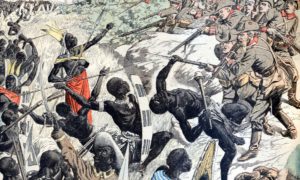With liberalism facing its greatest test since the end of the Cold War, international human rights organisations need to adapt to survive.
By Rupert Abbott, Daniel Eyre, Jenna Holliday and Ou Virak*

A fragment of the Berlin Wall
With wars raging across the world, from Syria to Nigeria, the corresponding refugee crisis, shrinking space for civil society, and the rise of right-wing populism, 2016 was annus horribilis for human rights.
Behind this deteriorating situation are a number of trends, which suggest not only that worse may be yet to come but also amount to an existential crisis for the international human rights movement.
Human rights international non-governmental organisations (INGOs) recognise that new challenges call for new responses. We join others in identifying strategies that will be crucial to defending rights in a changing world.
The end of history
The fall of the Berlin wall in 1989 signaled the end of the Cold War and ushered in an era of optimism for liberal democracy, with respect for human rights – particularly civil and political rights – as one of its cornerstones.
That year, Francis Fukuyama asked in his seminal essay whether the world was at the “End of History?”
With the defeat of fascism in the middle of the 20th century, and the collapse of communism towards its end, Fukuyama described the “unabashed victory of economic and political liberalism … the end point of mankind’s ideological evolution and the universalization of Western liberal democracy …”
The years that followed were a heyday for liberal internationalism, with the foreign policies of liberal democracies – led by the US – guided by the aim of enlarging the “community of market democracies”, and, with this, their dominance. Continue reading

